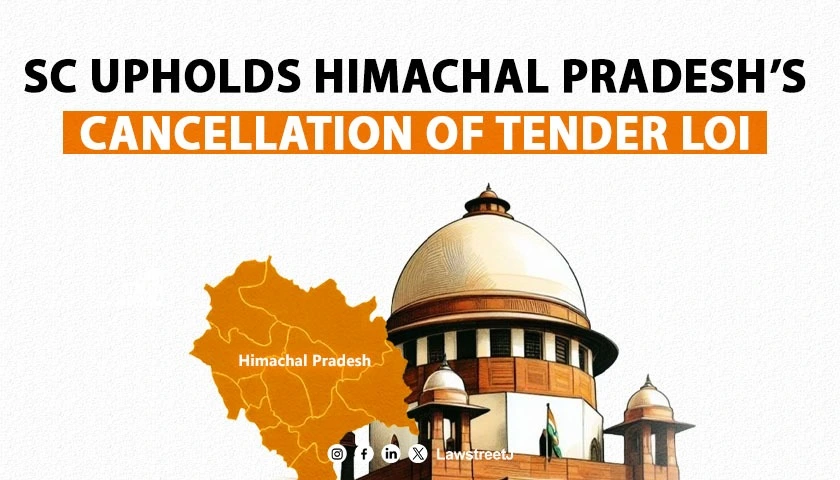New Delhi: In a critical judgment delivered on November 24, 2025, the Supreme Court of India allowed the appeal filed by the State of Himachal Pradesh, upholding the State’s decision to cancel a Letter of Intent (LoI) concerning a major tender for Public Distribution System (PDS) modernization. The bench comprising Chief Justice Surya Kant and Justices Ujjal Bhuyan and Nongmeikapam Kotiswar Singh set aside the judgment of the Himachal Pradesh High Court, which had directed the State to proceed with the contract. The case—State of Himachal Pradesh & Anr. v. M/s OASYS Cybernetics Pvt. Ltd. (Civil Appeal No. _/2025 arising out of SLP (C) No. 6531/2025)—centered on the legal nature of an LoI and the State’s administrative discretion in tender matters.
The dispute arose after the State cancelled an LoI issued to M/s OASYS Cybernetics Pvt. Ltd. (respondent-company) for the supply, installation, and maintenance of electronic Point-of-Sale (ePoS) devices. The State argued that the LoI was conditional and that the company failed to fulfill several prerequisites, including compatibility testing and furnishing cost break-ups.
Addressing the core issue of the LoI’s nature, the Supreme Court held that it did not create enforceable rights. The judgment noted that the LoI was a “provisional communication signifying the Appellant-State’s intent to enter into a formal arrangement upon fulfilment of certain technical and procedural conditions.” Relying on established jurisprudence, the Court reiterated: “A letter of intent merely indicates a party’s intention to enter into a contract with the other party in future. A letter of intent is not intended to bind either party ultimately to enter into any contract.” Consequently, the Court found “no difficulty in holding that the LoI did not give rise to any binding or enforceable rights in favour of the respondent-company.”
The Court then examined whether the State’s cancellation was arbitrary, as claimed by the respondent-company and accepted by the High Court. While acknowledging that the initial cancellation letter was “laconic,” the Court evaluated the two main justifications subsequently offered by the State: a blacklisting complaint and persistent non-compliance with LoI prerequisites.
The Court dismissed the blacklisting complaint as a valid basis, noting that the issue had attained finality in prior proceedings and did not represent a subsisting disqualification under the tender conditions. However, the bench found weight in the second justification, observing that the respondent-company’s actions—such as manufacturing over 5,000 devices without successfully completing mandatory testing at NIC Hyderabad or furnishing itemized cost details—were unilateral. The Court noted that the High Court had wrongly equated the company’s readiness with legal compliance: “The respondent-company’s diligence in producing hardware or training personnel was taken as evidence of compliance, though these were not the steps demanded by the LoI. Compliance in law must be with the document that governs the relationship, not with the bidder’s self-chosen course of conduct.”
Ultimately, the Court concluded that the State’s decision to cancel the LoI did not suffer from arbitrariness under Article 14. “The constitutional guarantee against arbitrariness is not a charter of commercial expectations; it is a safeguard against irrationality, and none is established in this record.” The Court further observed that the cancellation, which led to a fresh tender open to all, enhanced transparency: “Where the effect of administrative action is to enhance openness and restore competition, Courts are doubly cautious before imputing mala fides.”
While setting aside the High Court’s direction to enforce the LoI, the Supreme Court also granted equitable relief to the respondent-company. It directed the State to “hold a fact-finding enquiry in association with the respondent-company and ascertain the details of the ePoS machines, components, or allied services produced or supplied under the cancelled LoI and their utilisation or taking over by the Department during the pilot or demonstration stages.” The State was further directed to “assess the value and costs of installation of such machines, components or services and reimburse such verified cost and expenses on the principle of quantum meruit, to make good the losses suffered by the respondent-company.” This reimbursement was limited, as the Court clarified that “no further claim for loss of profit, expectation, or consequential damages shall survive.”
Case Details
Case Title: State of Himachal Pradesh & Anr. v. M/s OASYS Cybernetics Pvt. Ltd.
Case Number: Civil Appeal No. _/2025 (Arising out of SLP (C) No. 6531/2025)
Court: Supreme Court of India
Coram: Chief Justice Surya Kant; Justice Ujjal Bhuyan; Justice Nongmeikapam Kotiswar Singh
Date of Judgment: 24.11.2025
Citation: 2025 INSC 1355
For Appellant-State:
Mr. P. Chidambaram, Senior Counsel
For Respondent:
Mr. Sanjeev Bhushan, Senior Counsel











